It’s not about the data, but what you do with the data.
Teaching how to leverage data for driving innovation, especially for non-tech businesses.
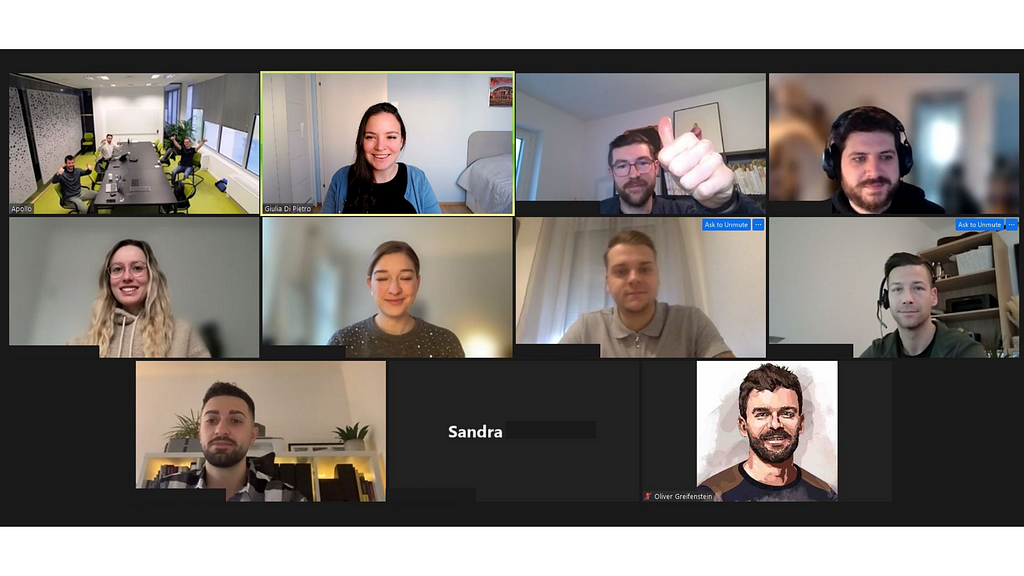
In the age of data, every business has become a digital business, but not every company is aware of it or taking advantage of data’s full potential. According to the statistics, only 57% of enterprises are currently using data and analytics to drive strategy and change. With digitalization here to stay, it’s important for businesses to learn techniques to leverage the data that they are nonetheless gathering to achieve further growth.
In the course titled “Business Operations & Process Mining”, offered by the joint degree study “Digital Business Management” between FH Oberösterreich and Johannes Kepler University in Linz, Oliver Greifenstein (Senior Director of Product Growth Management) shared his knowledge on how to do just that: use data as basis for innovation and growth. The course was built in collaboration with other Dynatracers, such as Alois Reitbauer, Florian Ortner, Giulia Di Pietro, and Michael Plank, who contributed backstage to the content, taught their own sections and formed the “judging panel” for the final presentations.
The creation of the course was also supported by the Know Center (research institute from the Graz University of Technology), who provided tools to support students to leverage data: the Safe-DEED Data Service Cards, Data Map, and Data-Driven Business Canvas. These tools were developed by the Know Center with research funding from the European Union.
The course roadmap
12 students attended the 2 ECTS course, which extended over 4 days covering topics such as data-driven business models, transforming data into value, agile working methods, and, naturally, data security and privacy.
Let’s look at the course roadmap into more detail.
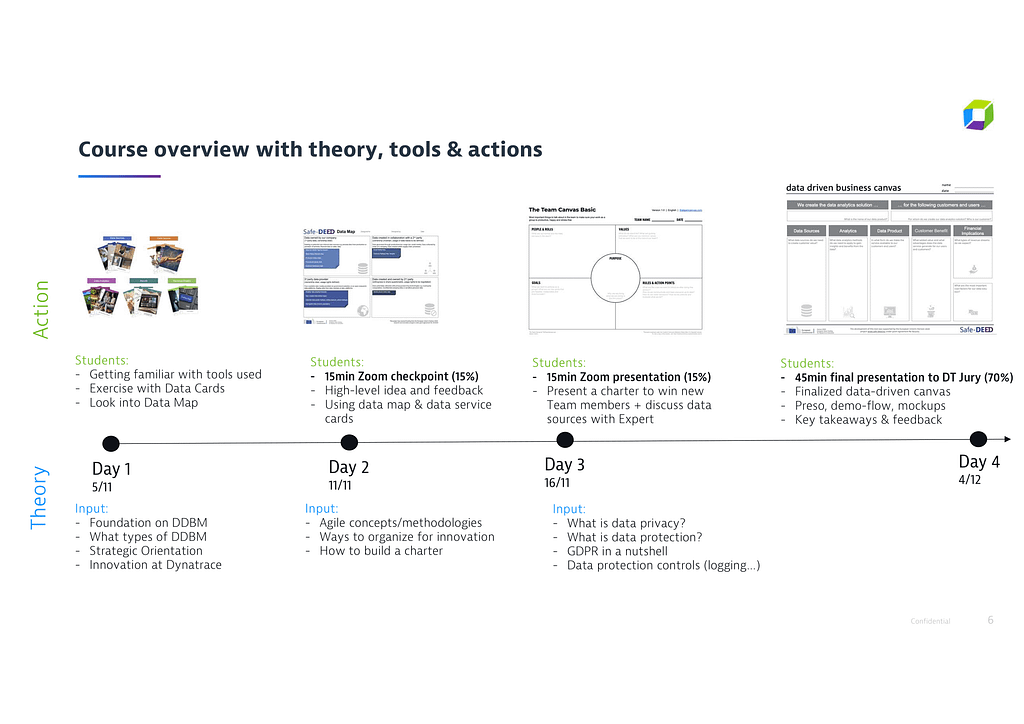
Day 1 — Data-driven business models
On the first day, the students gained a theoretical insight into what a data-driven business is. Often, it’s wrongly misunderstood that a data-driven business is a business that collects and resells data. In reality, it goes deeper than that. Modern companies use data to improve their products and accelerate their growth.
At the end of the day, they were divided into 3 groups and tasked with analyzing an existing “traditional” business and developing a new business model based on the data that these companies acquire (or could start acquiring).
The chosen companies were:
- Ottakringer GmbH — the largest brewery in Vienna
- Wacker Neuson — a construction machine company headquartered in Munich, Germany
- Linz AG — a company providing energy supply, municipal services and public transportation for Linz, Austria
Day 2 — Value Creation Teams
To be able to implement a great business idea, you need to have a great team to behind you. That’s why on day two, the students gained insight into the Value Creation model. This model is a type of organizational structure that is currently implemented by Dynatrace (read more about it here: From Software Startup to Global Player: How Customer Value Shapes your Organization).
As part of their assignment, the team had to create their ideal Value Creation Team with all the roles needed to make their business idea reality.
Day 3 — Data protection
Lastly, you can’t talk about data without talking about security and privacy. On the second to last day of the course, the students learned everything they need to know about data retention and life cycle management, including GDPR and other regulations.
As a final task before the presentations on day 4, they were asked to review their current business model and ensure that their ideas did not breach any data privacy regulations.
Day 4 — final presentations
Short disclaimer: the business ideas presented in this blog post were part of an exercise done by students at the FH Oberösterreich and JKU in Linz. They do not reflect any current business models from Ottakringer GmbH, Wacker Neuson, and Linz AG.
On the last day of the course, the students were invited to present their data-driven business models in front of a panel of judges composed of Dynatrace employees.
Here’s a quick overview of the great ideas they came up with:
Ottakringer GmbH Innovation
Company description
Ottakringer GmbH is the largest brewery in Vienna and is known for its Ottakringer Helles lager beer, also known as the 16er-Blech (“can of the 16th” hinting at the district where the brewery is located).
Data overview
The students analyzed the company and with the help of the Safe-DEED tools, composed a map of which data is (allegedly) being collected by the company and which data could be collected in future.
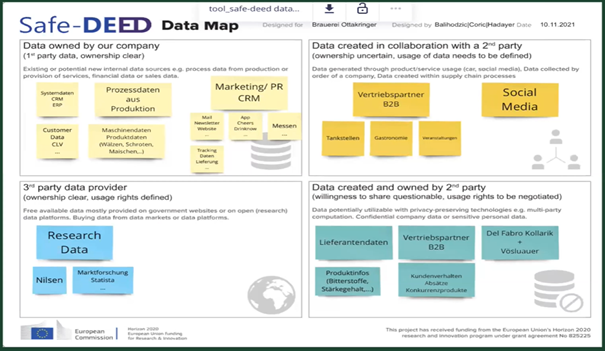
The students then tied in this data with three different areas which could be optimized in the company: general, clientele and production. Since it was not possible for them to get deeper insights into the process, supply chain, and more “hidden” secrets of the business, they decided to focus on how to acquire more customers, create a new revenue stream and uplift the image of Ottakringer.

Business idea
The team developed a new product, app and related marketing campaign called “#meisechzena” (my 16th). Consumers nowadays love a personalized service and craft beer is all the rage. The idea is to give beer lovers the opportunity to configure their own Ottakringer based on their personal taste.
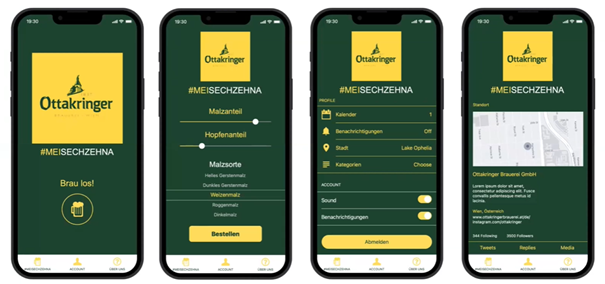
Data privacy and security
Since collecting data is involved in this product, the team clearly states how and why data is being collected, to ensure that no data privacy laws are being broken. Users of the app would then be informed about what data is being collected and how it will be used, following all the correct guidelines.
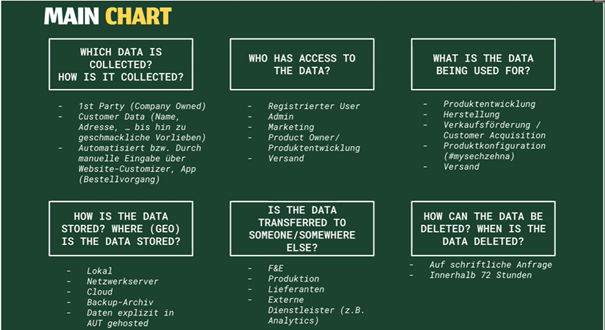
Wacker Neuson innovation
Company description
Wacker Neuson is a leading manufacturer of compact and construction machines, with a broad range of products and extensive services for the construction industry and agriculture.
Business idea
After elaborating on which data the company could have access to and leverage, the team decided to revolutionize the business by introducing IoT.

Processing data like product-generated data, marketing and sales data, weather data, geographical data (and more), can be used to improve the efficiency of processes, the quality of cement, the planning of building projects, as well as creating digital solutions that are perfectly fit for the client’s needs.
Here’s a great example of how data can be implemented to improve the experience with a concrete compactor. Thanks to the processed information that the company has, the compactor can self-regulate to produce the optimal concrete for its current situation.
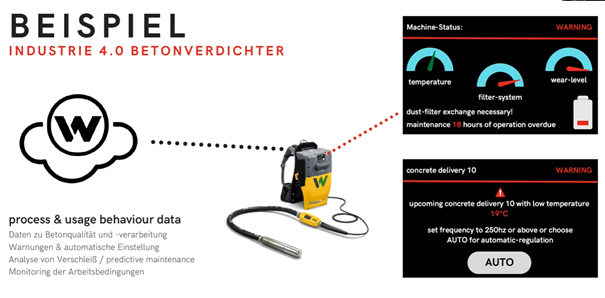
The idea also includes a mobile app to support the monitoring of constructions sites. With live tracking of logistics, overview of the quality of the concrete, and more.
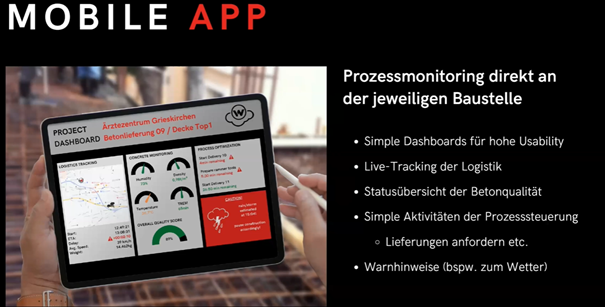
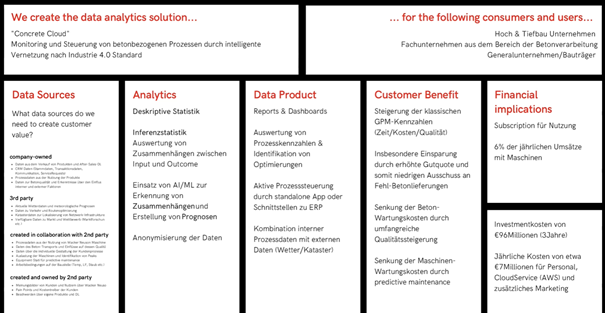
Linz AG
Company description
Linz AG, or LINZ AG, is a city-owned company providing energy supply, municipal services, and public transport in the city of Linz and another 115 municipalities in Upper Austria. Since Linz it’s a very large company, the team decided to narrow down their analysis and focus on mobility, particularly electric mobility.
Data overview
With the help of the data cards, they created a map of which data revolves around Linz AG in the domain of e-mobility.
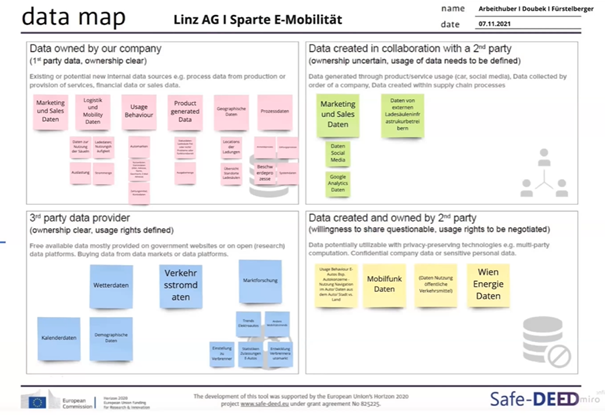
Then they settled on achieving the following goals:
- Open the “black box” of sustainable e-mobility and making it more understandable
- Implementing sustainability via tracking and measurements
Business idea
To achieve those goals mentioned above, they decided to develop a connected mobility app to track and measure sustainability related to mobility, called “ReGreen X Connect”. The app is built on the basis of gamification: the smaller your carbon footprint, the more points you can collect and redeem for Linz AG products or other partners’.
Until the end of 2021, there were nearly 30.000 electric cars being registered in Austria, showing that consumers are turning more and more towards electric mobility, and this represents a big potential for growth.
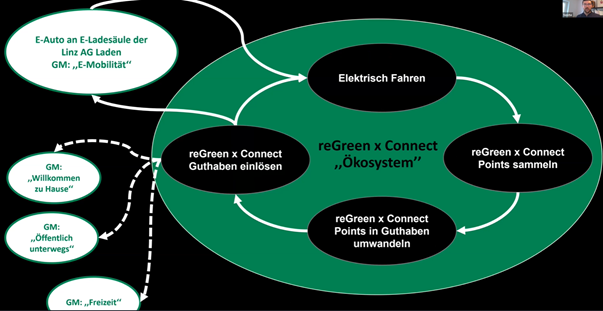
Users can collect points by charging their car on the charging stations of the Linz AG network and by driving on electric power. The points can be then redeemed for a discount on charging or for their free time (depending on which partners are on board).
The more points collected; the fewer emissions are produced. Every kilometer counts.
ReGreen X Connect wants to reward drivers for every kilometer driven on electricity, because it reduces CO2 emissions, creates better air, and improves life quality for everyone. Furthermore, the data collected via the rewards app can be used to continuously improve Linz AG’s products and services.
A great success
It’s astonishing to see what the group of students produced in such a short span of time, given the right tools and knowledge, and freedom to innovate.
The course was a huge success and the Dynatrace team received great feedback overall from the students (even though some aspects will need to be tweaked for future attendees):
“It was a really fascinating course! Huge compliments from my side. I would definitely attend it again. I liked hearing stories from your own experience working at Dynatrace and developing products. That’s something you could do more in the course.” — Sascha
“I found it great to have the possibility to prepare an executive pitch. It’s a skill that you need to train: gathering all the details and selling the business idea at a higher level.” — Katharina
“This course was the highlight of our semester. We learned a lot of best practices and practical examples from your work.” — Dejan
Innovating is an act of creativity, but creativity needs a solid ground to grow roots and flourish. Harnessing the right data can help any business innovate and grow in new, often unexpected, directions. We are proud that Dynatrace can help businesses do just that. Furthermore, that our Data Business experts are sharing this vital knowledge with students and companies.
And what we’re finally looking forward to is having the possibility of officially wrapping up this course in real life and with some drinks.
It’s not about the data, but what you do with the data. was originally published in Dynatrace Engineering on Medium, where people are continuing the conversation by highlighting and responding to this story.
